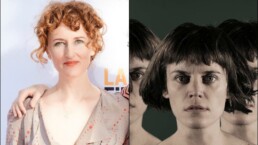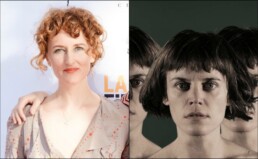Director Amber Sealey and Gemma Brockis of ‘No Light and No Land Anywhere’ Talk Working With a Predominantly Female Cast and Crew [LISTEN]
"I love women that make weird, strong films." –Amber Sealey
[soundcloud url=”https://api.soundcloud.com/tracks/268185673″ params=”color=ff5500&auto_play=false&hide_related=false&show_comments=true&show_user=true&show_reposts=false” width=”100%” height=”166″ iframe=”true” /]
I meet Amber Sealey and Gemma Brockis at the Culver Hotel a day after the world premiere of their film, “No Light and No Land Anywhere,” showing at the 2016 L.A. Film Festival. These two women radiate confidence and creativity, and what I felt in that moment in person translates beautifully in their film. During our conversation, we talk about the difference for artists working in London vs Los Angeles, a majority of their cast and crew being made up of women, and the strong artists that inspire them. We begin:
When was the first time you met, and what drew you to each other?
Gemma Brockis: We met back in London, at an art space/museum.
Amber Sealey: We were 21 and we were working there. [The space] had these 21-year-old kids as ushers, basically supposed to be guarding this art, but instead we would just give each other backrubs!
(Laughter)
That’s so funny–when I was in middle school my best friend and I would give each other hand massages, so I get it!
AS: We still do that. I’m always like, ‘Can you please give me a back rub Gemma.’
GB: Haha! I also had a theater company, we were in a show together and became really good friends. We really wanted to do something together again, at least I did anyway! I didn’t care what it was I just wanted to work with Amber!
“Here, in Hollywood particularly, there is this emphasis on fame and blockbusters. A lot of Brits I know that are doing really well are kind of embarrassed, ‘Oh shit, I’m famous…that’s really embarrassing.'” –Amber Sealey

What would you say is the difference between being an artist in LA vs London?
AS: I worked in London for seven years in what’s called devised theater, although I did a lot of television, a little bit of film, and a lot of voice-over work over there too. I think the difference is, culturally, Britain’s government supports the arts. There’s just a lot more freedom to be flexible and try new things. There is not this pressure to succeed in the way we have it here.
Here, in Hollywood particularly, there is this emphasis on fame and blockbusters. A lot of Brits I know that are doing really well are kind of embarrassed, ‘Oh shit, I’m famous…that’s really embarrassing.’ Here in Los Angeles, there are a lot of people where that’s their only goal. Obviously, when you have a little bit of fame, you get a little bit more power and can get a little bit more money, so it does help you make the art you want to make. So I think people’s heart desires come from a worthy place, but I think in LA it’s easy to get really distracted by the celebrity side.
Let’s talk “No Light and No Land Anywhere”; how was the script-writing process?
AS: Gemma’s father died when she was young, and we are good friends, so over the course of our 20-year friendship we’ve had conversations. I know Gemma has mentioned what her life would’ve been like had her dad been around in her teens, so I took that teeny grain of an idea and ran with it.
GB: I had some involvement, but it was really on the floor acting more than the idea of the film or shaping the story.
“[Miranda July] is just a great friend and someone who really likes supporting art that she believes is worthy…” –Amber Sealey

Miranda July’s name is attached to the film, what was her involvement?
AS: Miranda and I met in college, we were 18 and met working in theater. I can’t even remember how I officially asked her to be apart of it, but she’s just a great friend and someone who really likes supporting art that she believes is worthy and wants to help shine a brighter spotlight on.
I read a statistic that 83% of your cast and crew were women, was that intentional?
AS: It totally was, for sure. How can we miss the statistics that are coming out about women [in the industry], it’s like–wow, we have to change that. We’re still climbing up that hill, we’re not quite at the top yet, but I think everybody has to do their part to think outside of the box on how to be more inclusive. We had an all-female camera crew. We had one male camera assistant that came on for one or two days.
GB: He was alright.. haha!
AS: I told him he couldn’t speak!
(Laughter)
Did you entrust your cinematographer to capture the look and feel of LA, or did you have shots in mind prior to shooting?
AS: I actually framed the [B-roll] shots, sometimes I shot them! I was very specific about that. We don’t have a shot list, but we’d have a discussion about what we want and our cinematographer Katie [Goldschmidt] and I would get it together.
“I think that’s one of the great things about LA; there is so much beauty everywhere. I’m a huge fan of freeway shots, I think they’re so beautiful. Then you’ve got gorgeous mountain ranges… I mean, it’s so easy to just grab a camera and go out and shoot.” –Amber Sealey
The camerawork is one of my favorite things about the film. It made everything feel so alive.
The Hollywood Boulevard stuff was very guerrilla style–I mean, as much as you can with an ARRI AMIRA camera. It’s pretty big! I think that’s one of the great things about LA, there is so much beauty everywhere. I’m a huge fan of freeway shots, I think they’re so beautiful. Then you’ve got gorgeous mountain ranges… I mean, it’s so easy to just grab a camera and go out and shoot.
The elderly people in the film were so great! Were they all actors?
AS: The person that plays Lexi’s father is my real life dad. I was born in England and left when I was three, so I knew that my dad had the perfect accent of a British person who had been living in the United States for like, 37 years. The very old people who were in their 90s, that was a mix. I did put out a casting call. A friend of mine who I had known, that has nothing to do with film, wrote me saying ‘My mother-in-law is 92 and she’s always wanted to be an actor.’ Apparently she had this fantasy life where she always wanted to study it but her parents refused to let her study it in college. So I drove to meet Phyllis Fisher at a Coco’s diner, she’s the one who goes up the stairs really fast in the film. She’s such a character! What’s actually really sad is that two of them have passed away since we shot the movie. Phyllis’s husband Ben passed, he was over 90, and the guy who tells her to go to the beach, Bertram, also passed away. So it was bittersweet having the screening last night because their families were there.
“I love women that make weird, strong films.” –Amber Sealey
So many aspects of this film are inspiring, including yourselves. Who do you each look to for inspiration, film-related or otherwise?
GB: Oh gosh…
AS: Well, me–right Gemma?
GB: Haha! It’s really strange, my boyfriend actually asked me this question yesterday, and in all honesty, I would say a lot of the time it is my friends. I know that sounds like an easy answer,0 but it’s true. A lot of the time, there are women I admire and want to work with and make them my friends. They are the people who inspire me. Amber is one of them.
AS: I agree, I think there is something really special about friends. You can see their process because you know them and they can talk about their work with you in a way that can inspire you more because it’s not this crazy, unattainable thing. There are so many female filmmakers that I admire too: Lynne Ramsay, Kelly Reichardt, Miranda July, Andrea Arnold, Jane Campion. I love women that make weird, strong films.
Morgan Rojas
Certified fresh. For disclosure purposes, Morgan currently runs PR at PRETTYBIRD and Ventureland.




